Alcohol abuse always negatively affects human health.
As a result, the whole organism suffers: internal organs, brain, nervous and other systems.
The best advice that can be given in this case is to completely stop drinking alcohol (or at least drink in smaller doses). If you are predisposed to having such painful feelings with a hangover, then they can not only reappear, but also worsen.
The psychological cause of anxiety: solutions
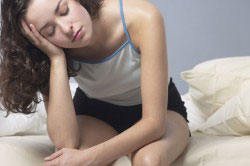 What to do if you tried to solve the problem with alcohol, but it backfired? On the one hand, remember this lesson and do not repeat it again. On the other hand, of course, in addition to learning a lesson, you need to alleviate the condition:
What to do if you tried to solve the problem with alcohol, but it backfired? On the one hand, remember this lesson and do not repeat it again. On the other hand, of course, in addition to learning a lesson, you need to alleviate the condition:
- carry out detoxification activities, as indicated above;
- try not to dwell on painful thoughts and feelings;
- switch and divert attention from the painful state of mind. For example, you can read a book or watch a movie (choose a comedy), go for a walk (but keep in mind that if you have a hangover, you should avoid physical activity);
- do not be alone with your thoughts, avoid loneliness. It's good if it's around close person. You can call friends, but do not bring your communication to another booze;
- think about the positive things in your life, such as children or accomplishments at work, loving wife(husband), an exciting vacation that you are planning for the summer, etc. you will see that there are a lot of positive things in your life, do not forget about it;
- don't blame yourself. Everyone has the right to make a mistake, so do not punish yourself for it;
- think about how things could have been worse;
- find positive sides. In any situation, no matter how fatal it may seem, you can find something good. Try to find the same thing in yours - and notice how you immediately feel better.
In the future, when the hangover passes and everything calms down a bit, you can seek help from a psychologist or psychotherapist. Or try to solve the problem that gnaws at you on your own:
- acknowledge the existence of the problem;
- think about what you personally can do to solve it; whose help you may need to enlist;
- draw up an action plan to solve the problem;
- start implementing this plan step by step.
This will allow you to learn how to solve problems and not turn to alcohol for help in difficult situations.
Incorrect behavior while intoxicated: how to survive the consequences
 If you have a feeling of anxiety as a result of "feats" performed in a state of alcohol intoxication Don't worry, everything is solved. So what can you do:
If you have a feeling of anxiety as a result of "feats" performed in a state of alcohol intoxication Don't worry, everything is solved. So what can you do:
- in case you woke up in the morning and realized that you don’t remember anything;
First, calm down and bring yourself to life with the help of anti-hangover measures. Next, contact the people you drank with the day before. Surely they will help you restore events that you do not remember. Well, if it turned out that you did nothing unacceptable. Although the fact that you do not remember anything after drinking is a very bad “bell” that you need to pay close attention to;
- if your behavior while intoxicated was unacceptable.
If it turned out (or you probably remember yourself) that your behavior was incorrect, first of all calm down and do nothing until the hangover passes. But don't drag it out over time. Go up to everyone you offended, etc., and apologize. No need to look for excuses or humiliate yourself in front of these people. Choose the position of an adult and make it clear that the current situation is very unpleasant for you, you regret it.
If this is not the first time you get drunk so that the next morning you suffer from a terrible hangover, then you probably know that in addition to the usual lovers of the green snake, other unpleasant symptoms also torment you. This may be temporary memory loss, hallucinations, you may be scared or feel guilty and depressed.
Why does this happen, why does a hangover torment you with a feeling of fear and anxiety?
The main causes and signs of a hangover
With a hangover, the body experiences severe intoxication, the cause of which is acetaldehyde, which is formed during the breakdown of ethyl alcohol, as well as various impurities found in alcoholic beverages. As a result, absolutely all systems and organs of our body suffer, not only the liver, kidneys and heart, but also the brain and the entire nervous system.
What do we experience with a hangover? the strongest headache, body aches, nausea and even vomiting, tremors of the limbs, palpitations, cold sweats, chills or a feeling of heat, cardiac arrhythmia, changes in blood pressure, loss of strength and much more.
However, in addition to these physiological signs of a hangover, there are also psychological ones, such as:
- Guilt, anxiety,
- Anxiety and confusion
- depression, despair,
- In rare cases, suicidal tendencies.
If every feast in the morning turns into such experiences for you and you worry about why this happens, you need to find out their reasons and learn how to effectively overcome these painful sensations.
How alcohol affects the body
Under the influence of alcoholic beverages, the body experiences serious overload, and psychologically, including: causeless fear, panic attacks, unreasonable anxiety and depression. The main reasons for such conditions are as follows:
It is the liver that is responsible for the utilization of alcohol and its decay products in the body. And if alcohol comes in too large quantities or the liver is damaged, it does not have time to completely and quickly process ethanol. As a result, the drinker may experience tremors, sudden surges in blood pressure, disruptions in the heart rhythm, which leads to feelings such as panic and a sense of fear, especially the fear of imminent death.
- Job disruption nervous system
The state of intoxication is the most significant signal that the nervous system is affected. At the same time, the drinker first experiences a sharp excitement, joy, revival, and then - inhibition of human functions, their sharp decline. Usually this is first expressed in cheerful excitement, talkativeness, sometimes aggressiveness and intemperance, submission to one's instincts, there is no self-criticism and the ability to control oneself.
It is because of this condition and possible deviations in behavior in the morning that many lovers of strong drinks experience a painful sense of guilt and shame, especially if they don’t remember at all what they did yesterday.
Psychological aspects of fear and anxiety - why it happens
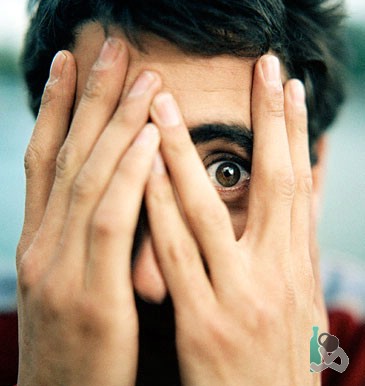 First of all, the feeling of anxiety and fear with a hangover is not a cause, but only a consequence. All the reasons lie much deeper and it is because of them that a person becomes addicted to alcohol, as to the easy way relieve stress. In fact, in this way we flood difficulties and problems instead of solving them.
First of all, the feeling of anxiety and fear with a hangover is not a cause, but only a consequence. All the reasons lie much deeper and it is because of them that a person becomes addicted to alcohol, as to the easy way relieve stress. In fact, in this way we flood difficulties and problems instead of solving them.
The main psychological factors for the emergence of fear and anxiety are as follows:
- Avoiding problem solving with alcohol
- Memory lapses (temporary loss) with a hangover,
- Pathological behavior in a state of intoxication.
Scared and anxious with a hangover: what to do
If in the morning you are tormented by unpleasant sensations, you are scared, hard at heart and nothing makes you happy - first of all, you should try to get rid of a hangover. To do this, there is a whole algorithm of actions that help with intoxication of the body:
- Take a warm shower
- Drink plenty of fluids (not alcohol), often, little by little, best green tea, chamomile, mineral water without gas,
- Drink lemon juice or take vitamin C
- Rinse your intestines and stomach
- Drink one of the anti-hangover remedies.
In addition to detoxification, try to alleviate your condition in the following ways:
- Do not dwell on the feeling of fear and anxiety,
- Watch a funny movie, read, go for a walk,
- Try to avoid loneliness - go to a meeting with a friend, but only without drinking,
- Think about all the good things that you have in life, about what joyful events you are expected in the future, etc.,
- Do not blame yourself - each of us has the right to make a mistake, just try so that this does not happen again,
- Start solving problems soberly. You need to act, and not ask yourself why.
Feelings of fear and anxiety with a hangover often accompany people who are prone to actively abuse alcoholic drinks. The feeling that something is going wrong, the feeling of impending death, panic for no reason - all this can be constituent parts hangover syndrome, and a person needs to know how to deal with these unpleasant feelings and at the same time not hurt himself even more.
Causes
Hangover panic attacks do not develop on empty place. These conditions have a number of pronounced physiological prerequisites, against which unpleasant sensations are formed. These include:
- sweating, which increases against the background of an increase in alcohol;
- tachycardia developing as a normal physiological reaction;
- or complaints of pain in any part of the body.
Patients with a hangover are not always able to associate the symptoms that appear with the use of alcohol, and therefore they quite naturally become scared.
After all, drinking alcohol, few people really think about what effects it produces on the human body. Not knowing about the effects of alcohol, a person involuntarily begins to evaluate the symptoms that have appeared in him, look for their causes, remember diseases that may be accompanied by these symptoms. As a result, a feeling of intense panic gradually grows, caused by the understanding that something in the body is not going the way it should.
Interestingly, the terrible state itself is not scary, but its consequences are much more dangerous:
- development of sharp panic attacks is possible;
- various phobias gradually form;
- the patient begins to have thoughts that have a manic connotation;
- various somatic disorders develop, which a person ascribes to diseases that are absent from him.

How to deal with unpleasant symptoms
Hangover anxiety usually develops in the context of a variety of other symptoms that accompany the condition.
To prevent the development of an unpleasant feeling and stop the progression of all signs of a hangover, it is recommended to direct all your efforts to remove ethanol decay products from the body.
This process is well helped by special drops that can be purchased on the Internet. What to do if panic attacks develop after alcohol? First of all, the patient is advised to take a cool shower. Such a simple procedure will sober up a sick person a little, improve his physical and moral condition, stabilizing him a little.
A simple remedy like vitamin C will also help to eliminate toxins from the body. You can drink a few tablets containing this vitamin, make tea with lemon, or, alternatively, eat a few citrus fruits. Vitamin C improves the general condition of the body, and is also an effective antioxidant that eliminates toxic effects.
Why does a hangover cause panic? The thing is . A simple tea with chamomile or mint, which has a calming effect on the body, can help to cope with it. Drinking plenty of water can also help flush out toxins from the body. Suitable for this plain water, fruit drinks or a variety of juices.
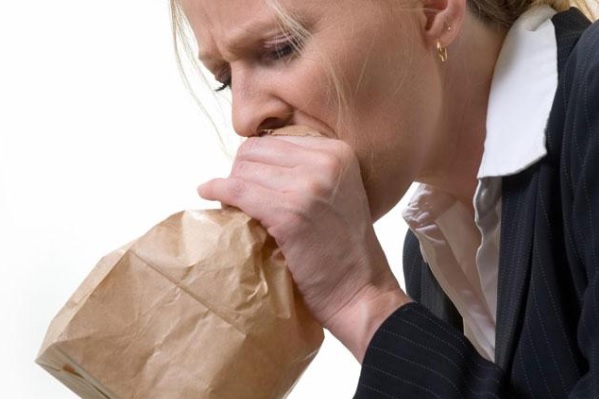
Eliminate Panic Anxiety
The worst panic that can disturb a person against the backdrop of a developing hangover usually passes quite quickly if you know how to deal with it correctly. In addition to removing alcohol toxin from the body, it is also important to stabilize the nervous system, reduce the severity of an unpleasant feeling of anxiety, which causes the patient the main inconvenience.
If the fear of a hangover is persistent, and it was not possible to get rid of it even if the recommendations designed to cleanse the body of toxins are followed, then it is still recommended to visit a pharmacy. True, the purchase of drugs should be treated with extreme caution.
For example, it is strictly forbidden to take drugs aimed at improving the functioning of the heart.
Why is it forbidden to use them with a hangover to eliminate tachycardia, which can cause panic? The fact is that these drugs are not combined with alcohol and will cause only a more pronounced worsening of the patient's condition against the background of a hangover, and not his improvement.
If the patient needs to calm down and extinguish the feeling of anxiety, then the best options against the background of a hangover will be:
- Motherwort;
- Valerian;
- Glycine.
These drugs have a mild effect, and also do not have a negative effect on the heart and blood vessels, which means they protect these organs. human body, preventing them from working even worse than they are on the background of alcohol intake.
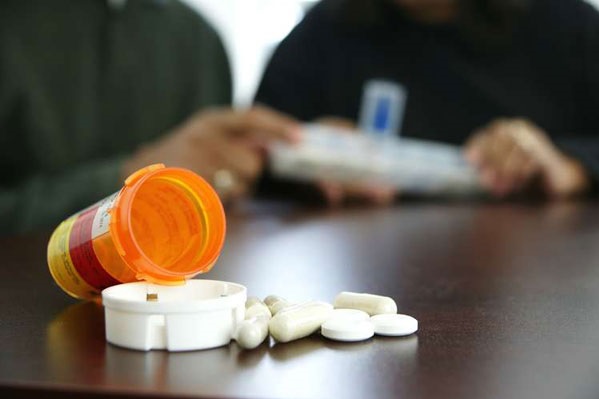
What not to do and why
A panic attack after a hangover can provoke a whole cascade of actions that ultimately lead to the death of the patient. There is a list of things that are strictly forbidden to do after drinking alcohol, so as not to worsen your own condition. These include:
- a ban on the use of Aspirin and Paracetamol, since these drugs can provoke the onset of internal bleeding;
- a ban on the use of Phenazepam, since this drug, when combined with alcohol, becomes toxic;
- you can’t fight a hangover by drinking alcohol inside again, as this can provoke the development of poisoning;
- after a hangover, it is forbidden to visit a sauna or bath for some time, as the heart may not be able to withstand the increased load.
Often the patient considers it vital to take one or another drug to combat anxiety. . No matter how strong the feeling of death, it is recommended not to use drugs against the background of alcohol intoxication of the body. In this case, it is best to seek help from doctors so that they not only stop the symptoms of intoxication, but also decide whether the person needs additional help in the treatment of any chronic diseases.
Panic attacks while taking alcohol are not uncommon, so you need to clearly understand what you can do if such a condition suddenly develops!
(Visited 456 times, 2 visits today)
Unreasonable excitement, a sense of imminent danger, uncontrollable fear are frequent companions after drinking alcohol. And it's pretty hard to deal with them.
Anxiety manifests itself for no specific reason and can be caused by a premonition of possible or imagined absurd consequences:
- the presence of physiological disorders, such as sweating, rapid heart rate, vomiting, pain;
- fears that she appeared.
Naturally, with a hangover syndrome, not the most pleasant processes. There are many reasons for concern.
It becomes scary from the fact that it is impossible to determine exactly how the body will behave through time. A lot of pictures and situations of not the most pleasant content immediately appear in my head.
Not so much a dangerous anxiety state as its consequences:
- unexpected panic outbursts of mood;
- obsessive phobias and thoughts of a manic nature;
- disorders that involve unrealistic fantasies about possible illnesses.
Often in the background alcohol poisoning people are beginning to wonder how not to die of a hangover. Thoughts of death sometimes lead to dire consequences.
Why hangover panic attacks happen
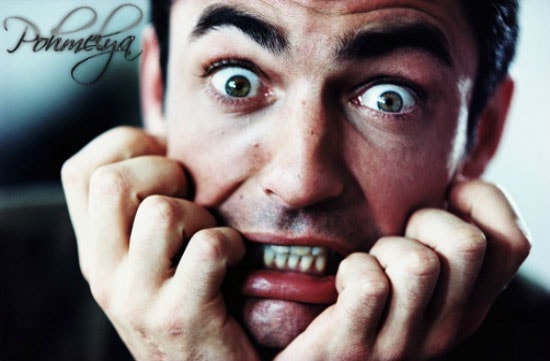
What is the reason for the unreasonable appearance of fear and anxiety?
Ethanol entering the body penetrates into tissues and cells within 3-5 minutes. At the same time, it is also a psychotropic substance that affects changes in the functioning of the central nervous system and the human psyche.
In small doses, it contributes to the production of the hormone dopamine by the brain substance, which acts in the same way as the hormone of joy, pleasure. There comes a state of indescribable euphoria, strong excitement and permissiveness.
If the rate of alcohol consumed is exceeded, as happens during noisy feasts, then the hangover syndrome will have the opposite effect.
The feeling of happiness and satisfaction will be replaced by panic attacks of anxiety. This will be due to the fact that at high concentration ethanol begins to gradually depress the nervous system.
The hangover that occurs with alcoholism looks even more dangerous for its consequences:
- alcoholic psychosis;
- delirium tremens;
- severe hallucinations;
- feeling of uncontrollable aggression.
In this case, only narcologists within specialized clinics will be able to cope with the symptoms.
Unreasonable attacks of anger and a feeling of strong irritation in a patient with alcoholism can lead to the fact that he will harm not only himself, but also those around him.
How to survive a hangover and its symptoms

To cope with an aggravating condition, which is characterized by the presence of excitement, panic attacks, causeless anxiety and fear of danger for your life, immediately try to help your body.
It is urgent to remove the breakdown products of alcohol from the body:
- invigorating cool or cold and hot shower. It refreshes quickly enough, and the adrenaline received at the same time will contribute to the release of toxins;
- vitamin C, as well as foods and drinks containing it in sufficient quantities. If there is ascorbic acid in the medicine cabinet, take it;
- brew strong green tea with mint, warm milk or kefir;
- fructose-rich honey. Helps the liver to restore its work;
- purified water.
To improve your mood, listen to your favorite music or watch a funny comedy. Try to distract yourself, do not go in cycles in depression.
Remember your favorite activities, it is possible that they will drive away the surging panic attacks and the state of inexplicable danger and fear.
You can bring yourself to a natural feeling while walking. Meeting with friends will only benefit you.
If one of them has consumed alcohol with you and is also feeling unwell, fresh air there will be something to remember. All worries will pass when a loved one is nearby.
Treating Panic Anxiety Hangovers
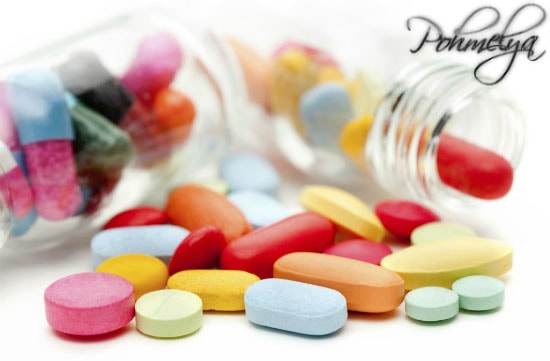
Go to the pharmacy if your heart is still restless. But do not rush to buy all the drugs in a row. Some of them can increase feelings of fear and panic attacks attacks and anxiety.
It is dangerous to take with a hangover, it would seem, such familiar and harmless drugs:
- "Valocordin";
- "Corvalol";
- "Valoserdin";
- "Phenibut".
The active substance, like phenobarbital, can disrupt the full functioning of the brain and lead to inappropriate behavior, provoke panic attacks and anxiety attacks.
"Afobazol" will also be useless. This sedative begins to work only 3 days after ingestion.
Herbal tinctures and preparations will help well, as " Grandaxin», « Motherwort», « Valerian". They will be safe for the liver. Acquisition of narcologists is recommended and " Glycine».
Sedative, mild action, drug. Provides a sense of calm and helps to cope with insomnia.
When death comes from a hangover
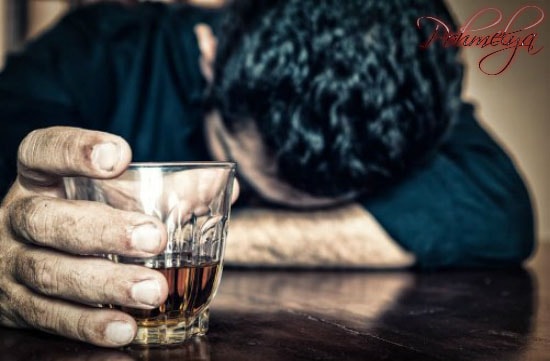
Alcohol itself is not so terrible as the consequences of poisoning that it causes in the body, making the functioning of the organs of the liver, kidneys, stomach and intestines defective.
Is it possible to die from a severe long hangover?
A large amount of ethanol, acetaldehyde or acetic acid can lead to a threat to life during exacerbations of existing diseases:
- heart failure, after a heart attack;
- digestive system. Liver failure, gastric ulcer, pancreatitis;
- urinary system. Nephritis, cystitis;
- nervous system. Epilepsy, encephalopathy, myopathy;
- with bronchitis or pneumonia.
A fatal outcome is possible with a fatal single dose of a strong alcohol-containing drink in the amount of 750 ml. There is a feeling of lack of air, blue lips and a sharp increase in body temperature.
Allergic attacks from the body itself are also terrible. Proteins that are part of alcohol are no longer digested and enter directly into the bloodstream. The characteristic itching, rash and redness appear on the skin.
Unpredictable Quincke's edema is the main source of death in hangover syndrome.
It calls:
- swelling of the larynx, subcutaneous tissue of the face;
- panic attacks;
- intolerable itching.
Death in this case occurs within one hour. At the first manifestations or similar symptoms, you should immediately call ambulance or try to get to the nearest hospital department.
What is dangerous to do and why with a hangover
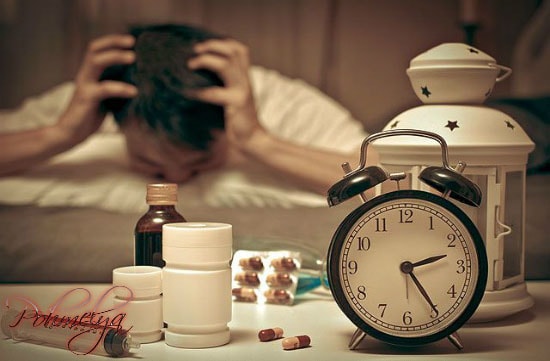
You can avoid serious consequences after drinking alcohol-containing drinks. To do this, you need to know exactly what to avoid and fear.
- Aspirin, Paracetamol. They can cause internal bleeding;
- "Phenazepam". Unacceptable drug in combination with alcohol;
- Do not try to cure a hangover with alcohol. It is possible to take the wrong dose and subsequent poisoning of the body;
- Refuse to go to the bath or sauna. The heart may not be able to withstand too high a temperature;
- drugs are prohibited, as Valoserdin», « Corvalol" And " Valocordin».
Regular or frequent use alcohol leads to an exacerbation of diseases, the formation of pathologies and death. The consequences cannot be avoided.
It is very difficult to restore the body after alcoholic beverages, and sometimes it is completely impossible. There is such a feeling, whether in the hours of a hangover the body is close to death. Then it remains only to stop drinking.
- The essence of the problem
- Anomaly mechanism
- Causes of pathology
- Symptoms of the disease
- Treatment of pathology
Various troubles can await a person with a hangover, panic attacks are one of the unpleasant and rather dangerous manifestations. Quite often, excessive alcohol outpouring is intended to relieve psychological stress, but if it results in such deviations during a hangover, then serious measures should be taken. Panic attacks are dangerous for their psychological impact, which can lead to tragic consequences.
The essence of the problem
A panic attack is considered to be an attack of pronounced fear, close to panic, for no apparent reason, which may be accompanied by various symptoms of a vegetative and other nature. This phenomenon quite often becomes the result of a severe hangover, especially in those cases when the day before the use of alcohol was aimed at eliminating the effects of stress. At the same time, an attempt to get rid of such an attack with another portion of alcohol can only aggravate the situation.
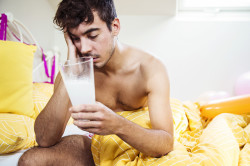 Chronic manifestations of a panic attack are a sure sign of a serious illness, and alcohol becomes a catalyst for the process. In general, 2 types of pathology are distinguished: panic attacks with emotional exacerbation (panic) and without it (without panic). In the first case, psychological factors stand out clearly - in the absence of any physical changes, emotional stress appears in the form of fear, with an emphasis on incomprehensible premonitions. In attacks without panic, on the contrary, emotions give way to vegetative signs - a feeling of cardiac arrest, a feeling of squeezing, etc., although no organ pathologies are detected during examination.
Chronic manifestations of a panic attack are a sure sign of a serious illness, and alcohol becomes a catalyst for the process. In general, 2 types of pathology are distinguished: panic attacks with emotional exacerbation (panic) and without it (without panic). In the first case, psychological factors stand out clearly - in the absence of any physical changes, emotional stress appears in the form of fear, with an emphasis on incomprehensible premonitions. In attacks without panic, on the contrary, emotions give way to vegetative signs - a feeling of cardiac arrest, a feeling of squeezing, etc., although no organ pathologies are detected during examination.
The complexity of this disease lies in the fact that, having clearly felt failures in the internal organs, a person goes to the doctor, and he, after conducting examinations and not finding confirmation of the disease, gets off with the standard advice: you need to drink less! As a result, two completely wrong directions of treatment often appear - a new portion of alcohol and the path to alcoholism, or self-medication with the use of strong drugs, which can cause side effects. Repeated panic attacks from a hangover only exacerbate the disease.
Back to index
Anomaly mechanism
 Most researchers agree that panic attacks are caused by increased production of adrenaline and norepinephrine by the adrenal glands, a violation of the metabolism of neurotransmitters (serotonin, GABA). With a sharp release of these hormones, a spasm of blood vessels occurs, reflex reactions of the body appear in the form of increased blood pressure, tachycardia, and increased respiration.
Most researchers agree that panic attacks are caused by increased production of adrenaline and norepinephrine by the adrenal glands, a violation of the metabolism of neurotransmitters (serotonin, GABA). With a sharp release of these hormones, a spasm of blood vessels occurs, reflex reactions of the body appear in the form of increased blood pressure, tachycardia, and increased respiration.
During the peak period, the oxygen content in the blood increases significantly and the concentration decreases. carbon dioxide, which causes a feeling of stunnedness and a feeling of fear. The duration of one panic attack is 12-20 minutes, and in some people - up to 1-1.5 hours, after which the symptoms disappear and no deviations can be recorded. Alcohol intake is not a direct cause of this phenomenon, but it enhances and accelerates the action of the main factors.
Back to index
Causes of pathology
The main causes of hangover panic attacks are factors that can cause an increase in the production of the stress hormone (adrenaline). The main factors are considered to be prolonged psychological overstrain, significant stress, unhealthy lifestyle, taking some medicines. These factors are especially active in the presence of a certain hereditary predisposition or organic brain damage (birth asphyxia, pathologies during pregnancy, traumatic brain injury, concussion).
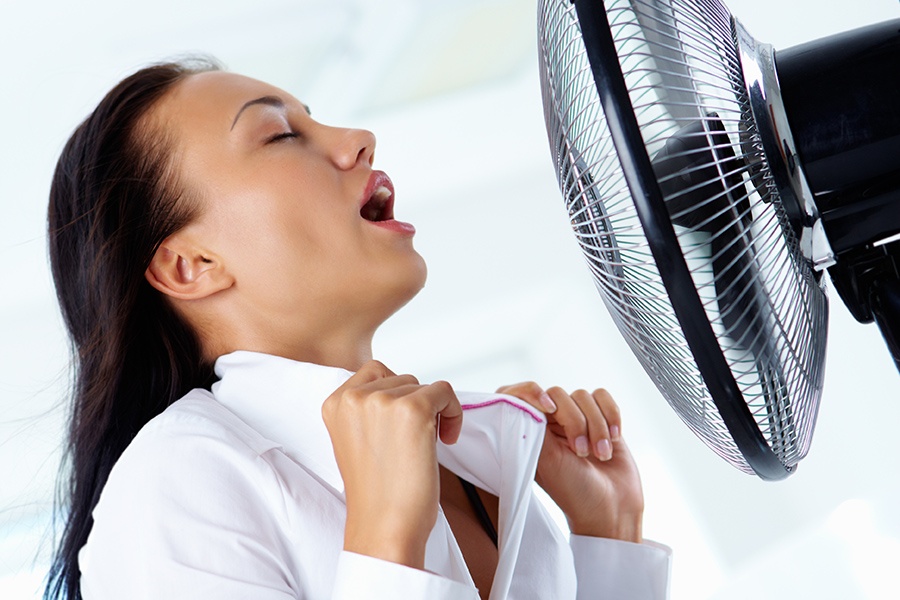 The development of panic attacks is most likely in people who represent the following personality type: hysteroid, epileptoid or paranoid. The risk of panic attacks is significantly increased in the presence of cardiovascular diseases (especially ischemic disease), endocrine diseases (thyrotoxicosis), mental and depressive disorders, and various phobias.
The development of panic attacks is most likely in people who represent the following personality type: hysteroid, epileptoid or paranoid. The risk of panic attacks is significantly increased in the presence of cardiovascular diseases (especially ischemic disease), endocrine diseases (thyrotoxicosis), mental and depressive disorders, and various phobias.
Alcohol is not considered a direct cause of panic attacks. Moreover, people who have experienced stress or are under constant psychological stress often use it as a medicine, and for some time it helps. And then comes the so-called alcohol addiction when having a hangover the likelihood of a panic attack increases. Moreover, statistics show that in people belonging to the high-risk group (bankers, managers, executives, etc.), the first manifestation of a panic attack was found with a hangover, after excessive drinking. In this case, it works as a catalyst for the process.
Back to index
Symptoms of the disease
Hangover panic attacks start unexpectedly for no apparent reason. First of all, mental symptoms appear: a feeling of great danger; fear of death, loss of consciousness or fear of an indefinite nature; feeling of stiffness in the muscles, throughout the body; fear of going crazy feeling of instability and dizziness, heaviness in the chest.
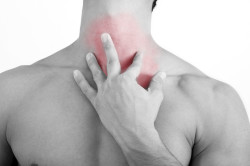 The following manifestations can be attributed to somatic short-term signs: a feeling of heat, a lump in the throat, increased sweating, a feeling of respiratory failure, hypertension, palpitations, trembling, gastrointestinal anomalies, numbness of the extremities.
The following manifestations can be attributed to somatic short-term signs: a feeling of heat, a lump in the throat, increased sweating, a feeling of respiratory failure, hypertension, palpitations, trembling, gastrointestinal anomalies, numbness of the extremities.
After the attack passes, a person has a fear of a recurrence of an attack, they begin to worry about a violation of health, various phobias appear. For example, sometimes there is agoraphobia - fear of a certain place, with which a panic attack was somehow associated. As a result of a past attack, the following disorders may appear: confidence in the presence of a dangerous, and even fatal disease; fear of traveling in transport, flying in an airplane, being among a large crowd of people, etc.; birth.
The appearance of a panic attack during a hangover does not reduce the severity of the perception of what happened. Having first appeared after drinking, the disease usually recurs without being tied to alcohol, and this developmental option should be taken into account. Of course, you can’t take medication after alcohol, but you should limit its intake, and then begin serious treatment.









